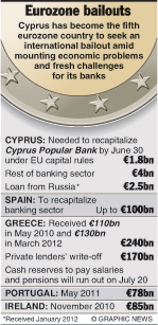Sunday Times 2
The ill wind from the west
NEW DELHI – At the nadir of the financial crisis four years ago, many Asian governments came to believe that robust growth had led to a near-”decoupling” of their economies from the West and its ongoing problems. But now, as the eurozone teeters and America’s recovery weakens, Asia, too, is showing signs of faltering.
Some Asian politicians will, quite conveniently, blame the West for any softening of growth. But their failure to pursue necessary structural reforms and economic opportunities is equally responsible, if not more so, for the region’s growing travails.
Consider India.

According to the forecaster International Market Assessment, “capital flows that have dried up are not…a reflection of global market conditions,” but of a loss in confidence among investors, arising principally from fiscal mismanagement, which has led to “price instability, falling investments and eventually a decline in…growth.” With the “government in dormancy,” IMA concludes, “India is quickly losing the plot.”
India’s situation is indeed worrisome. Double-digit food-price inflation has been accompanied by debate about the share of Indians living below the poverty line, and, indeed, where the poverty line should be drawn. Official statistics use an average daily income of 32 rupees ($0.57) a day to separate the merely poor from the desperately impoverished.
Instead of addressing the central paradox of contemporary Indian society – poverty amidst plenty – India’s government has buried its head in the sand. It proclaims bold reforms, which it then repudiates before the ink is dry. Even worse, growing official corruption is sapping private-sector dynamism.
But India is not alone in stumbling. China, too, is fearful of a growth slowdown and rising wage inflation. In response, China’s central bank is lowering interest rates to spur domestic investment, and the resulting depreciation of the renminbi’s exchange rate has helped to keep exports afloat. But China’s import figures for the first half of this year have virtually flat-lined, suggesting that Chinese firms are not investing in new equipment – and thus that China’s economy may hit the doldrums soon.
Although their political systems are mirror opposites, there are striking parallels in some of China’s and India’s deepest structural problems. Both countries undertook reforms – China in the 1980s and India in the 1990s – that decentralised decision-making, and both progressed rapidly. India was compelled by its democracy to pursue a politically decentralising route, yet much economic decision-making authority remained embedded in New Delhi’s ossified bureaucracy, retarding growth. By contrast, China achieved economic decentralisation, but preserved centralised political power, transferring economic-management responsibilities largely to provincial officials, which has created its own imbalances.
Thus, even as China is compelled to shift from exports to domestic consumption in order to sustain growth, India continues to rely on inward investment, exports of services and raw materials, and lower fiscal and current-account deficits to maintain its growth course. But its most damaging deficit is to be found in governance, as is true of China, where the Bo Xilai scandal has exposed the pathological underside of China’s vaunted technocratic leadership.
Elsewhere in Asia, structural problems are also mounting. In Vietnam, inflation has hovered near 20% or more, with the government seemingly unwilling to embrace deeper reforms. Thailand’s interminable political imbroglio has left its economy at stall speed; the reformist zeal of Indonesian President Susilo Bambang Yudhoyono has petered out in his second term following the departure of Finance Minister Sri Mulyani Indrawati; and Japan seems to remain in a state of suspended animation.
Europe’s malaise, and the resulting rise of populist politics, suggests that Asia’s governments can ill afford to sit on their growth laurels. Indeed, they should heed a recent comment by Oxford University’s Pavlos Eleftheriadis about a Greek electorate “livid at being led by those who dishonestly caused the problem.” Indeed, according to Eleftheriadis, tax collectors in Greece today are confronted by bull-whip-wielding citizens. That sounds a lot like India nowadays.
There are bold ideas in circulation in Asia that could sustain and promote growth. The recent decision by the leaders of China, Japan, and South Korea to launch talks on a trilateral free-trade agreement among, respectively, the world’s second, third, and 12th largest economies is certainly audacious, though reaching an agreement between two of Asia’s great democracies and China will likely make the failed Doha Round of global trade talks seem simple.
But India is nowhere to be seen in all of this. Indeed, with Burma’s economy opening to the world, India ought to be taking the lead in seeking to stimulate South Asian growth and economic integration, for only by doing so can it anchor its neighbour within the region. Yet, when Prime Minister Manmohan Singh recently visited Burma, he had little to offer aside from the usual investment proposals. A bold initiative toward Bangladesh would also yield a strongly positive impact on growth, and yet nothing is happening there, either.
With the major emerging countries, particularly China and India, already in trouble, Asia can expect to be hit hard if the euro sinks. Before that happens, governments must seize the policy initiative, thereby strengthening global financial markets’ confidence in Asia’s ability to withstand the ill wind from the West.
Jaswant Singh, a former Indian finance minister, foreign minister, and defense minister, is the author of Jinnah: India – Partition – Independence.
Copyright: Project Syndicate, 2012. Exclusive to the Sunday Times
comments powered by Disqus


















